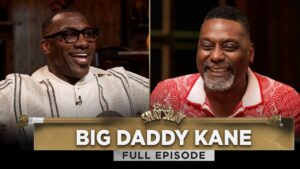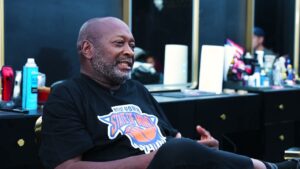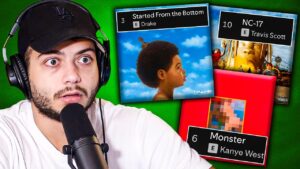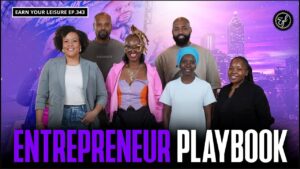On a new episode of Shannon Sharpe’s Club Shay Shay, hip-hop pioneer and Grammy-winning MC Big Daddy Kane reflects on his four-decade journey in the culture, from block parties in Brooklyn to performing with icons across genres and mentoring the next generation of lyricists.
Kane traces his love of hip-hop back to the borough that raised him. In the early 1980s, he was soaking in the sounds of DJ Kool Herc, Melle Mel, Afrika Bambaataa, and Grandmaster Flash, while rhyming kids on his block inspired him to sharpen his pen. What started as flipping hustler slang into rhymes became the foundation of his signature style.
A pivotal figure in Kane’s story is Biz Markie, who gave him his first big break and opened doors for him in the recording world. From street battles to unheard demos, Kane recalls a period defined by persistence, a trait that would make him one of rap’s sharpest lyricists.
Brooklyn’s hip-hop legacy stretches far beyond Kane, and he acknowledges the borough’s influence on the culture. He reflects on the next wave of talent, Biggie, Jay-Z, Lil’ Kim, Foxy Brown, Mos Def, Busta Rhymes, Joey Bada$$, and Pop Smoke, and how their stories were shaped by the same streets that raised him.
Kane also recalls moments that feel legendary in hindsight, like watching Biggie and Tupac freestyle at Madison Square Garden. His friendship with Pac dated back to the Digital Underground days, and he shares why he believed Biggie had the makings of the greatest MC, while Pac could have become the “Michael Jackson of hip-hop” if their lives hadn’t been cut short.
The conversation turns to the business side of music. Kane remembers lines wrapped around the block for vinyl releases, a stark contrast to today’s streaming era, where he feels payouts often fail to reflect artists’ work. He compares fast-food culture to the way listeners consume music now, quickly, and often without patience for artistry.
He shares stories of turning down a $1 million Death Row East offer from Suge Knight, performing alongside Bobby Brown, and how collaborations with Quincy Jones, Tito Jackson, Wu-Tang Clan, and Madonna gave him some of the most unforgettable experiences of his career.
Kane also reflects on how the role of battles has shifted over time. He remembers high-profile clashes like LL Cool J vs. Kool Moe Dee and draws comparisons to today’s Drake vs. Kendrick Lamar rivalry. For Kane, competition sharpens MCs but can derail careers if it spills beyond music.
Even as hip-hop has grown more commercial, Kane points to artists who keep the art of lyricism alive: Rakim, J. Cole, Kendrick Lamar, Lady London, Conway the Machine, and Benny the Butcher among them. Freestyle and wordplay, he insists, remain at the heart of the craft.
Hip-hop has always been bigger than just music for Kane. He connects its fashion roots to Black culture, and speaks on sharing space with legends across genres, from Marvin Gaye and Patti LaBelle to Luther Vandross, Ray Charles, and Miles Davis.
When the topic of trophies comes up, Kane admits his Grammy isn’t on display. For him, fan appreciation holds greater weight than awards, a reflection of his belief that hip-hop’s growth from neighborhood block parties to global festivals is its greatest achievement.
Kane’s sit-down with Sharpe wasn’t just a trip down memory lane, it was a living history lesson from someone who’s seen hip-hop transform firsthand. His reflections underscore how far the culture has come, while reminding listeners of the roots that made it possible: persistence, lyricism, and community.






